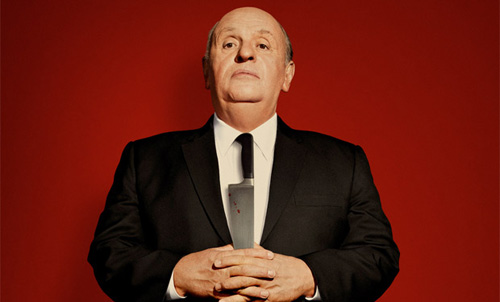“Hitchcock”
As an official “Hitchcock Expert,” it is challenging for me to write about the new film simply entitled “Hitchcock.” The challenge is to view the movie from the point-of-view of someone who doesn’t have 47 of Hitch’s 52 films, and 16 different books about the “master of suspense” on their bookshelves.
“Hitchcock” stars Oscar winners Anthony Hopkins as Hitch, and Helen Mirren as his wife and collaborator Alma Reville while the pair struggle to get their latest project made. It’s 1959, and the project is “Psycho,” a movie inspired by Robert Bloch’s similarly named novel about a cross-dressing serial killer with a mother fixation. Hitch becomes obsessed with the book, even waking his wife up to have her read aloud a particularly gruesome scene featuring decapitation. In short order, Hitch gets Paramount to agree to distribute his film (which he and Alma finance by mortgaging their Bel Air mansion), hires screenwriter Joseph Stefano (Ralph Macchio), and instructs his assistant Peggy (Toni Collette) to have her “minions” buy up every available copy of Bloch’s novel. “I want to control this,” Hitch tells her, and there, in a nutshell, is the character’s persona.
Under the guise of “adding drama,” screenwriter John J. McLaughlin has muddled things up by adding several unnecessary subplots. The most egregious is having Hitch interact with Ed Grein (Michael Wincott) as the murderous psychopath (labeled “the butcher of Plainfield”) who inspired Psycho. Alfred Hitchcock already had numerous personality problems (which I illustrate with film clips in my “How Hitchcock’s Childhood Fears Shaped His Films” seminars), so many, in fact, that the movie doesn’t need this ghostlike apparition telling Hitch what to do.
The next problem is the manufactured relationship Alma has with a younger, less talented screenwriter named Whitfield Cook (Danny Huston). The purpose of this ploy is to get Hitch to accuse Alma of having an affair with Whit. This allows Helen Mirren to react (in one of her strongest scenes), so the audience can see who really wears the pants in the Hitchcock household. Stranger still, although Whit and Alma collaborated on Hitch’s films “Stage Fright” (1950) and “Strangers on a Train” (1951), in “Hitchcock,” these two films are not mentioned. Instead, Hitch muses “Whit must have liked writing for Colbert,” before turning off the TV set where Alma is watching Claudette Colbert and Walter Pigeon in “The Secret Heart” (1946).
Other dramatic elements are real—Paramount’s Lew Wasserman (Michael Stuhlberg) really did fight with Hitch about not being allowed to visit the soundstage or see the dailies for Psycho. Hitch really did negotiate with the head of the ratings board (played by Kurtwood Smith) for a rating that allowed the film to be widely released, and Hitch really did have an active hatred of actress Vera Miles (Jessica Biel).
Hitch often fell in love with his leading ladies, and played Svengali to them, dictating the color and cut of their hair and how to dress (including what underwear to put on). Insecure about his working-class British background, and weight, to his dismay, his favorite, Grace Kelly rejected him and married a real life prince. Vera Miles was already married to her Tarzan co-star, Gordon Scott before she and Hitch met. Nonplused, the director was sure he could lure Miles away from her “beefcake” husband, by using “an entirely different approach.” As a result, her pregnancy was viewed by Hitch as a lover’s rejection.
But to me, the oddest thing about the Hitchcock movie is the absence of Hitch and Alma’s daughter, Patricia. Born in London, the couple’s only child attended the Royal Academy of Dramatic Art and appeared in several of her father’s films. In “Psycho” she played the co-worker in the real estate office who offers Marion Crane some of the tranquilizers her mother gave her for her wedding night. In the summer of 1959, Patricia’s three daughters were 6, 5, and 5 months old. Which means that grandma Alma’s “extra” time that summer would more likely have been spent playing with the children, than running around with Whit .
You see, I’m The Man Who Knew Too Much.
Comments? E-mail gi*********@*****st.net.









